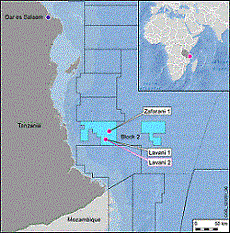

M a r k e t N e w s
Tanzania: Natural Gas Comes Ashore
Posted on : Wednesday, 20th August 2014

Natural gas discovered off the coast of Tanzania is now reaching the consumer as the first homes in Dar es Salaam are connected up. The hope is that energy will now become cheaper.
Tanzania's Petroleum Development Corporation (TPDC) has begun implementing an ambitious gas project. The aim is to supply hundreds of residents in the commercial capital of Dar es Salaam with natural gas to their homes for domestic use.
The pilot project, which was launched July this year, is already operating at Mikocheni suburb in the city. 57 families have now been connected to a gas pipeline.
According to Michael Mwanda, chariman of the TPDC board of directors, the aim of the project is to supply cheap gas to domestic customers in various parts of the city so they can keep their energy bills down.
"This is the first natural gas distribution infrastructure project under TPDC, with this system people will be able to buy gas in a pre-paid arrangement using special cards as they do with electricity," he said.
Gas instead of charcoal
Tanzania has abundant natural gas reserves, over 50.5 trillion cubic feet has been discovered so far. Experts say the gas deposits are large enough to make the country independent of foreign energy sources. They are a potentially significant source of revenue.
Local residents have expressed joy that this natural gas project would hopefully signal the end of charcoal use in the city.
Tanzanians are counting on the discovery of natural gas to lift them out of poverty
Charcoal is responsible for massive environmental destruction as its production exerts huge pressure on the country's forests.
Tanzania consumes over 1 million tons of charcoal annually, half of which is burnt by households in Dar es Salaam. The technology used to make charcoal is so inefficient that ten tons of wood are needed to produce one ton of charcoal.
"I think this is a very good project, we spend a lot of money buying charcoal, since gas is cheap we will use this money for other activities," said John Mwakitwange, a resident of Dar es Salaam.
Growth through gas
As one of the fastest growing cities in Africa with more than 4 million inhabitants, Dar es Salaam requires a substantial amount of energy to fuel its growth. According to local analysts, cheaper sources of energy could improve the well-being of most residents, particularly those who still live in poverty.
TPDC chairman Michael Mwanda said gas supplied through a pipeline is not only cheaper than other energy sources but is also more environmentally friendly.
"We hope more people will switch to using natural gas instead of charcoal and other energy sources that have proved to be bad for the environment," Mwanda added.
According to TPDC's acting General Manager James Andilile, the corporation has sought funding from Exim Bank of India so the project can be completed. A majority of residents will then have access to cheap natural gas.
He said about $8 million (6 million euros) is needed to finalize the project. Upon completion, residents of six suburbs including the up market Mbezi beach area will be connected to the pipeline.
Targeting industries
"The ultimate goal is to enable all Tanzanians use this natural resource, the few areas we have identified are just a start," Andilile added that several industries in Dar es Salaam would also be connected to the gas pipeline.
Three gas distribution centers have been constructed in Dar es Salaam
This would enable manufacturers cut production costs and reduce the prices of goods and services.
Observers say the availability of cheap gas could bring substantial economic benefits to Tanzania. These include boosting power generation and addressing the yawning energy deficit.
"Natural gas has the potential to offset the cost of electricity production from other sources. The country could generate up to 3500MW of electricity which would suffice for both domestic and commercial use," Haji Semboja, an economist from the University of Dar es Salaam noted.
Tanzania's power grid currently delivers about 773 megawatts of electricity. Most of it comes from hydropower which accounts for 71 percent of the country's total power generation.
Source : allafrica.com





























































